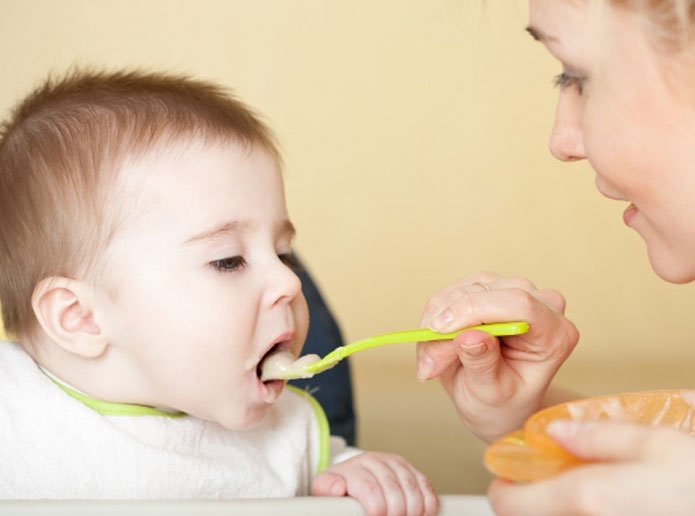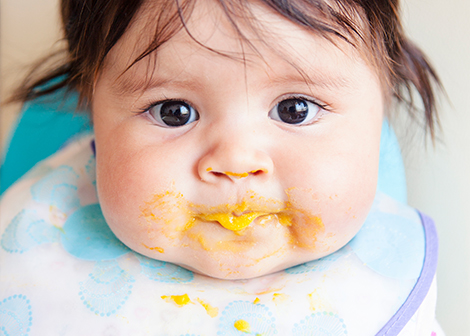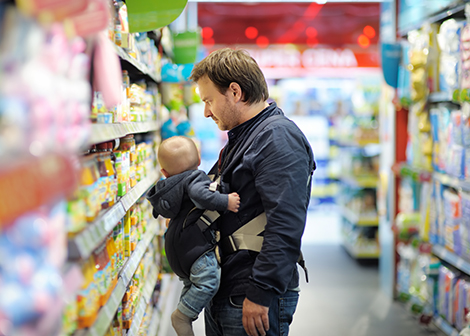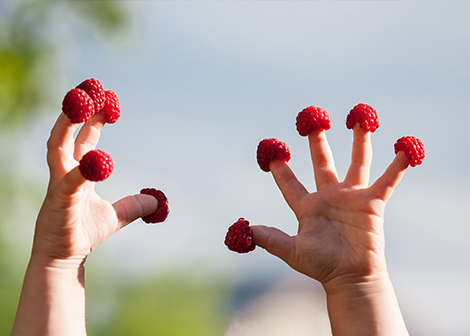Starting solids is an exciting time for parents but can be a bit daunting. Sometimes it makes us think of our own connection with food and our childhood memories.
Ideally, introducing solids should be a fun time for parents and babies. We provide the food and baby decides what and how much they will eat.
Babies learn by seeing, touching, smelling and tasting. They may spit food out or rub it over their face. This will be a messy time as your baby explores this new chapter.
Practice and routine
Eating, like everything else for babies, requires practice. Foods may need to be offered up to ten times or more before babies accept them.
Offering small amounts can be less frustrating for parents and lets babies ask if they want more. Allow your baby to eat to their appetite and let them tell you when they have had enough.
Babies love to know what is coming next so you might find it helpful to set up an eating routine: washing hands, putting a bib on, getting out the high chair etc.
Let babies enjoy their eating experience by limiting other distractions – try not to let them eat in front of a TV or tablet.
The why, when, what and how of introducing solids
Why
Babies go through dietary changes throughout the first year, but the main component to a baby’s diet and growth is milk.
Solids are introduced at around six months to supply extra energy, extra nutrients (such as iron), and to develop facial muscles and jaw movements that will support future language development.
When
It is recommended to introduce solids:
- at around six months of age (between five to seven months of age);
- when your baby can sit and hold their head up;
- when your baby has lost their tongue thrust reflex (this is where your baby pushes the food out with their tongue, designed to protect your baby from choking).
If your baby pushes the food out, wait a few days and try again.
What
Start with pureed foods with no lumps. Gradually increase the texture and amount of food as your baby gets older. You can go from pureeing to mashing the food with a fork so that your baby gets used to lumps.
By eight months of age, most babies can also eat finger foods such as sliced avocado, banana, cooked pasta, steamed vegies, or grated cheese. Your baby can have family foods from 12 months of age, without added sugar and salt.
Good first foods are iron rich, such as rice cereal, meat, fish, tofu, legumes, poultry, cooked eggs (white and yolk), vegies, fruit, and dairy.
Previously the advice was to withhold certain foods, but we now recommend a little bit of everything from six months of age. The only foods we recommend excluding are honey, raw egg, raw or uncooked meat (such as salami), and unpasteurised milk.
We also used to introduce one food at a time, but now research tells us that the number of new foods offered at a meal does not matter unless you have a strong family history of allergy.
If your baby is at high risk of allergy, you may want to introduce one new food every two to three days to see if there is a reaction. It has been found that delayed introduction of common allergenic foods can increase any allergy symptoms and decrease your child’s tolerance to allergenic foods.
How
When you are feeling relaxed and have plenty of time, wait 30 minutes after a milk feed and then offer a small amount of pureed solids (1 to 2 teaspoons) from a small shallow spoon.
Your baby can be offered cooled boiled water in a cup with their meals.
How much
For babies from six to eight months of age, offer two to three times a day, starting with a 1 to 2 teaspoons and increasing to ½ cup at each meal. By the time your baby is nine to 11 months of age, you can offer solids three to four times a day.
Allow your baby to self-regulate and tell you when they are full by closing their lips, turning away etc.
Gagging and choking
Many parents are frightened of their baby choking. Stay with your baby when feeding and stay calm if they gag. Coughing and gagging protects them from choking so encourage them to relax, cough and then safely swallow. You may then offer them some water.
When your baby gags it will be noisy and they will cough and splutter. When they are choking it will be silent and they will be unable to cough or make a noise.
Parents may feel more confident if they have done a first aid course for babies that covers choking. Some of the companies that can provide first aid for families are:
- Family First Aid
- Royal Life Saving – Heart Beat Club
- St John Ambulance – First Aid Courses
Drinks
6 to 12 months
Babies can have breastmilk, infant formula, and water.
Over 12 months
Babies can have breastmilk, full fat cows milk (around 375ml), and water. Avoid drinks containing sugar, such as fruit juice and soft drinks.
Food safety
- Stay with your child while they are eating
- Wash your own hands and babies hands before starting
- Clean utensils, cups, surfaces – you are your child’s gut guardian.
- Put food into a bowl or plate and serve food immediately
- Discard uneaten food from your baby’s bowl
- Reheat pre-prepared food thoroughly before before cooling it down to eat
- Never reheat food more than once
- Due to the use of pesticides, wash all fruit and vegies thoroughly before preparing
- Keep pets away from food
Quick guide
- Child and Adolescent Health Service – Baby’s first foods
Want to know more?
Look for Ngala Solid Start workshops in What’s Near You on this website or ask your local child health nurse.
The Raising Children Network – Introducing solids
tip sheet, tip sheets







